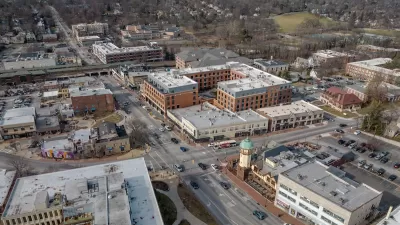Brookings Institute's “Confronting Suburban Poverty” is generating a lot of buzz. Community development leaders and planners took to Rooflines to voice opinions and critiques of the book, moving its authors to submit a response that you must read.
Confronting Suburban Poverty in America was released a few weeks ago, and the Internet has been abuzz with responses to it. One thing many agree with authors Elizabeth Kneebone and Alan Berube on is that suburban poverty is on the rise. Actually, it's exploded significantly over recent years, and federal policies are not equipped to meet the growing challenges.
On Rooflines, the Shelterforce blog, planning professor J. Rosie Tighe gave some praise to the book, noting that it does stress the importance of the perception of poverty in this country in shaping how it's addressed. Joe Kreisberg, offered a critique of the book that included its flawed definition of "suburban" and assertion that federal anti-poverty programs to date have been too "place based".
So what do the authors have to say about all of this? Well, for one, defining "suburbs" was a difficult task that they confronted carefully, being sure to reflect on the range of experiences and diversity among such locales. Interested in what else they had to say? Head over to the growing conversation on Rooflines.
FULL STORY: More Suburban Poor? Think Again

Planetizen Federal Action Tracker
A weekly monitor of how Trump’s orders and actions are impacting planners and planning in America.

Restaurant Patios Were a Pandemic Win — Why Were They so Hard to Keep?
Social distancing requirements and changes in travel patterns prompted cities to pilot new uses for street and sidewalk space. Then it got complicated.

Map: Where Senate Republicans Want to Sell Your Public Lands
For public land advocates, the Senate Republicans’ proposal to sell millions of acres of public land in the West is “the biggest fight of their careers.”

Maui's Vacation Rental Debate Turns Ugly
Verbal attacks, misinformation campaigns and fistfights plague a high-stakes debate to convert thousands of vacation rentals into long-term housing.

San Francisco Suspends Traffic Calming Amidst Record Deaths
Citing “a challenging fiscal landscape,” the city will cease the program on the heels of 42 traffic deaths, including 24 pedestrians.

California Homeless Arrests, Citations Spike After Ruling
An investigation reveals that anti-homeless actions increased up to 500% after Grants Pass v. Johnson — even in cities claiming no policy change.
Urban Design for Planners 1: Software Tools
This six-course series explores essential urban design concepts using open source software and equips planners with the tools they need to participate fully in the urban design process.
Planning for Universal Design
Learn the tools for implementing Universal Design in planning regulations.
Heyer Gruel & Associates PA
JM Goldson LLC
Custer County Colorado
City of Camden Redevelopment Agency
City of Astoria
Transportation Research & Education Center (TREC) at Portland State University
Camden Redevelopment Agency
City of Claremont
Municipality of Princeton (NJ)





























